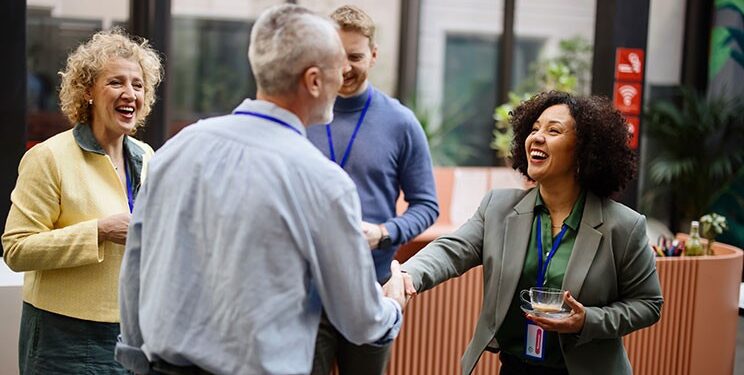How can you successfully reach out to prominent figures in publishing, marketing, and business? How can you persuade them to participate in an intimate gathering with you? How do you draw in over 40 top-notch journalists to a private event?
If you were to ask Sol Orwell, the founder of Examine, he would attribute it to one key factor: cookies. Or perhaps two: cookies and a purpose.
On November 4, 2017, Sol Orwell and Tammy Tibbetts, the CEO and co-founder of She’s the First, hosted a gathering of influential individuals at the inaugural NYC Charity Chocolate Chip Cookie Off. Esteemed guests included bestselling author Seth Godin; finance expert Ramit Sethi; Nick Ganju, co-founder of the billion-dollar company ZocDoc; Mark Manson, author of The Subtle Art of Not Giving a F*ck; and networking pro Keith Ferrazzi.
This Cookie Off event was a blend of media affair and charitable giving, demonstrating two essential components not only for hosting successful networking events but also for establishing valuable connections. And similar to crafting a great recipe, what you exclude often carries more weight than what you include.
The Cookies: Networking is about the individual, not their connections.
Initially, focusing on cookies may seem like an unconventional strategy for high-level networking. However, they symbolize something deeper. For example, consider the presence of Seth Godin.
“Let me tell you the truth,” Orwell shared with me, “I don’t have a personal connection with Seth Godin. Seth attended because his wife Helene, from By the Way Bakery, was showcasing a gluten-free bread she had been perfecting for years. When I conversed with Helene, I didn’t inquire about the attendance of her husband. It wasn’t about him; it was about her. It was about her work and her enthusiasm. If she brought Seth along—great.”
When I inquired with Brian Dean, an entrepreneur specializing in search engine optimization, about his decision to travel from Berlin, his response echoed similar sentiments: “Was the 3,965-mile journey worth it? Absolutely. Do these individuals have extensive networks compared to the average person? Probably. However, that wasn’t my motivation for connecting with them. I didn’t travel halfway across the globe to meet person X because they know person Y. Instead, I made the journey to engage with individuals who are funny, intelligent, and optimistic themselves.”
The trap in networking is constantly seeking to move up the ladder, allowing our egos to taint and ultimately ruin what could be a healthy relationship. While one eye is fixed on the person in front of us, the other is already scouting who they know and what they can offer. This mindset not only damages individual relationships but also hinders potential future connections.
According to Ferrazzi, the author of Never Eat Alone, “It all boils down to the person and being a high-caliber individual yourself. Transformative relationships progress through three stages: the connections you have, cultivating a supportive community among them, and collaboratively elevating each other to enact change.”
Instead of constantly seeking better prospects, our focus should be on engaging fully with the individual in front of us. Alternatively, perhaps even directing our attention beyond ourselves.
The Cause: Networking is about contributing, not acquiring.
Upon the event’s commencement, over 40 journalists from notable publications such as Forbes, Entrepreneur, Fortune, Men’s Health, Business Insider, and SELF were also present. Naturally, their attendance wasn’t coincidental; they were all invited. However, akin to the preceding point, the method of invitation is what holds significance.
“My intention was for them to mingle with me and my acquaintances and comprehend the positive impact we are striving to create,” Orwell elucidated. “Of course, I was organized. I maintained a spreadsheet with their names, emails, social media details, and affiliations. However, I refrained from explicitly stating, ‘Hey, you should come and cover this.’”
Balancing giving and receiving is a sensitive tightrope to walk. Is it disingenuous to mask our real motives in networking and build relationships on what some might perceive as pretext? It all hinges on the true intentions behind your actions.
The focal point of the Cookie Off wasn’t Orwell, the high-profile attendees, or even the cookies. Instead, it centered around a cause. She’s the First is a nonprofit situated in New York dedicated to sponsoring “girls who will be the first in their families to graduate high school,” predominantly in low-income countries outside the Western hemisphere.
As an immigrant himself, collaborating with She’s the First was, in Orwell’s words, “an obvious choice.” In addition, presenting a $30,000 check made a more profound impact than Milk and Cookies Bakery’s dark chocolate toffee potato chip crunch (which secured the title of the event’s most unique cookie).
Post-event, Dorie Clark, author of Entrepreneurial You and a long-standing contributor to Harvard Business Review, remarked, “I suggest allowing at least a year to pass before seeking favors. Establishing yourself as a giver rather than a networking opportunist is crucial.”
In a similar vein, Troy Osnioff, co-founder of JUICE, observed, “It was remarkable seeing everyone unite around Tammy and, specifically, the girls; suddenly, all our discussions took on a significant meaning.”
This doesn’t imply that networking must revolve around a charitable cause. Nevertheless, it underscores the importance of building and nurturing relationships based on causes larger than ourselves.
“True friends,” C.S. Lewis wrote, “do not spend time gazing into each other’s eyes. They may exhibit great tenderness towards one another, but they face in the same direction—toward mutual projects [and] objectives.”
Networking isn’t about you.
The essences of networking are paradoxical yet potent.
“I’ve expanded my network by giving,” personal branding specialist Leonard Kim asserts. “Initially, my sole goal was to ensure that others didn’t encounter the challenges I faced. Sol’s giving philosophy has instigated genuine transformations in philanthropic endeavors and fostered a sense of community in his network.”
Nonetheless, offering something delightful never hurts.


